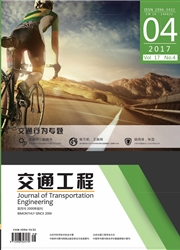

 中文摘要:
中文摘要:
因寻找路内停车泊位而在道路上低速巡航的车辆与其他车辆混合行驶,不仅造成交通拥堵,还增加了能源消耗和环境负担.基于分析停车过程中的停车巡航时间、停车持续时间、停车后到达目的地的步行时间以及停车费用等因素之间的相关关系,建立经济杠杆模型.该模型可以解析巡航停车过程中影响停车选择行为决策的关键变量,利用变量间的相关影响实现停车价格的优化调整,从而引导停车选择行为实现路内停车与路外停车的平衡.并以北京市中关村地区停车选择行为为实例,验证了经济杠杆模型的实用性和可靠性.
 英文摘要:
英文摘要:
Vehicles with low-speed cruising for on-street parking spots mixed with others that running on the road,not only cause traffic congestion,but also increase the energy consumption and environmental burdens. Basing on an analysis of the correlation between the cruising time,parking duration,walking time after parking and parking fee,etc.,the economic lever model was established. This model can resolve the key variables affecting the decision of the parking choice during the cruise for parking. This model uses mutual influence between variables to realize optimal adjustment of the price of parking,in order to guide vehicles to achieve a balance of parking choice behavior between on-street and off-street parking. The paper conducted an empirical study of parking choice behavior in Beijing Zhongguancun area,and proved the practicality and reliability of the economic lever model.
 同期刊论文项目
同期刊论文项目
 同项目期刊论文
同项目期刊论文
 期刊信息
期刊信息
